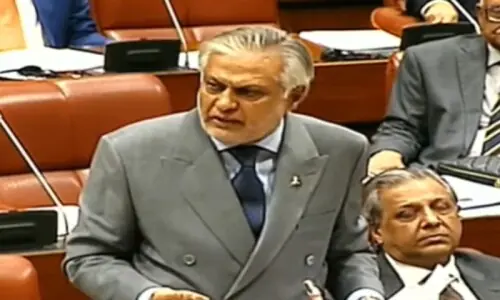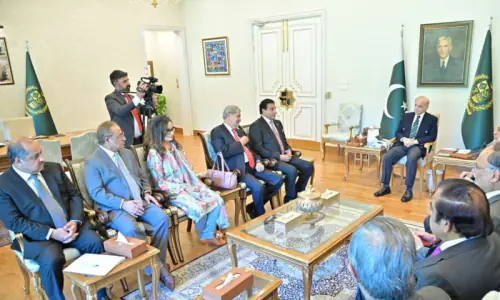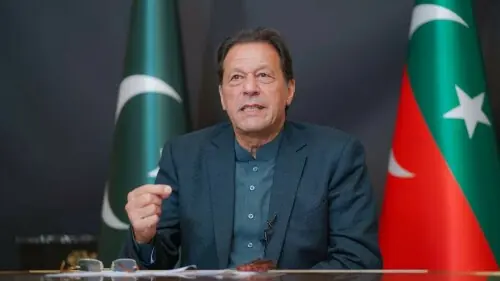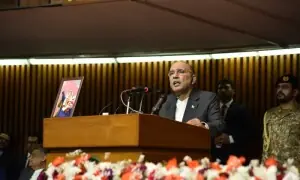PAKISTAN’S media producers and consumers have for years called for a stronger media regulator. In recent months, Pemra has tried to muscle up, warning against content that threatens ‘national security’, taking notice of scenes depicting suicides, and banning contraceptive ads (thankfully only temporarily).
Last week, the regulator banned three individuals from the air for engaging in a controversial discussion about which authority can decide who identifies as Muslim. Some would say this is an improvement from past years, when Pemra only stirred on Feb 13 to issue ridiculous dictates against Valentine’s Day programming. I say, be careful what you wish for.
A ban is never a good thing. It contravenes free speech, in the absence of which no democracy — no matter how tentatively democratic — can survive. As a regulator, it is Pemra’s duty to protect freedom of expression while ensuring that laws are upheld. The recent bans go against the spirit of sound regulation, which must enable, not censor, discourse.
Pemra has cited the complaints it received — over 1,000 of them — as justification for the ban. But this is mob rule by another name. If complaints result in bans, only those who scream the loudest will be heard. Regulators have to ensure that all voices are heard, and so should wield the blunt instrument of a ban with greater caution.
The regulator had warned channels to avoid incendiary and divisive topics during Ramazan. It has also promised to issue yet another code of conduct. But Pemra’s guidance is too clouded with vague language and sweeping statements about national security, offence, and decency, and only provide weak cover for what are ultimately authoritarian — and arbitrary — decisions. It doesn’t help that Pemra is perceived to act partially, exempting certain media producers from any kind of regulation. For example, Asma Jehangir made the astute point that the ISPR is never regulated.
It is Pemra’s duty to protect the freedom of expression.
The issue of religious discourse is particularly tricky. The questions of who is a Muslim and what role Islam should play in the state are central to the country’s identity and future. No matter how many voices are banned, these issues will keep trickling into public discourse.
By implementing bans, Pemra is indicating that there is a wrong — and so by implication a right — way to engage in discourse about religious issues. But we know this is not the case. As early as 1954, the Munir Report made it clear that Pakistanis will never agree on the parameters of Islamic statehood, Muslim identity and practice. As long as we have any plurality in media, these fundamental questions will remain contentious.
The worst thing we can do is push such debate off the air and behind closed doors. The past decade of violence has shown that sects and other religious groups are becoming more hardline, debate-averse, and prone to righteous entitlement, with recourse to violence the only way to silence alternate viewpoints.
By appearing on television and engaging in discussions, representatives of religious groups are taking an important step forward. On air, they are also forced to temper their views. This paper’s readers may be shocked by what they hear, but they should know that words spoken before the camera are generally the product of some self-censorship. Similar ideas are being disseminated in seminaries and mosques without any regulation or the need for temperance that television brings.
The real challenge before Pakistan is not that people think they can incite hate and violence on television, but that there is an audience for this. Past precedent suggests that neither channel involved in last week’s controversy has had its ratings fall. Rather than reactively ban individual voices, Pemra needs to think hard about changing the tenor of public discourse in Pakistan.
The solution lies in media regulation that promotes free speech, enables expression, and encourages diverse programming. Pemra has recently flagged its intent to ensure that 10 per cent of all broadcasts comprise public service messages. This is a good start, but we need more: educational content, documentaries, social justice-oriented entertainment, and other quality programming to make Pakistanis more informed, primed for critical thinking, and ready to engage in reasoned debate.
And what about those who transgress all moral and legal bounds with their on-air comments? Pakistan has a robust Constitution and laws covering libel, defamation, incitement to violence, hate speech and, however problematically, blasphemy. Rather than Pemra’s codes, it is the law of the land that should govern what can be said on air.
The religious scholar who sparked last week’s controversy made a clear call for violence on air. It is not sufficient to ban him from the airwaves — charges must be brought and a legal process ensued. We should demand this much, but we do ourselves a disservice when we confuse regulation with law enforcement.
The writer is a freelance journalist.
Published in Dawn, June 20th, 2016




























